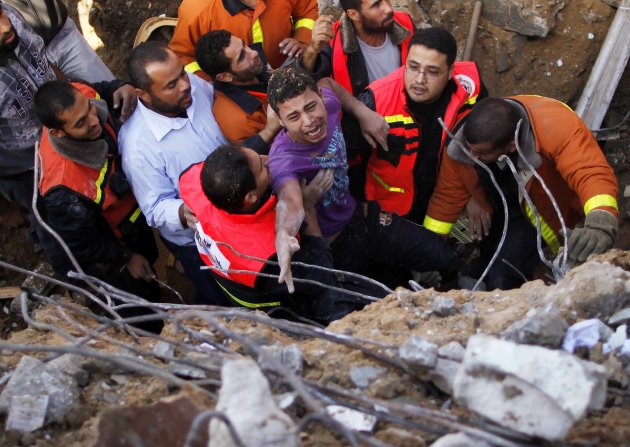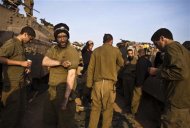GAZA/JERUSALEM
(Reuters) - Israel bombed dozens of targets in the Gaza Strip on Monday
and said that while it was prepared to step up its offensive by sending
in troops, it preferred a diplomatic solution that would end
Palestinian rocket fire.
Mediator Egypt said a deal for a truce to end the fighting
could be close. The leader of Hamas said it was up to Israel to end the
new conflict it had started. Israel says its strikes are to halt
Palestinian rocket attacks.U.N. Secretary-General Ban Ki-moon, touring the region in hopes of helping broker a peace arrived in Cairo, where he met Egypt's foreign minister in preparation for talks with the new, Islamist president, Mohamed Mursi, on Tuesday. He also plans to meet Israeli Prime Minister Benjamin Netanyahu in Jerusalem.
Israeli attacks on the sixth day of fighting raised the number of Palestinian dead to 101, the Hamas-run Health Ministry said, listing 24 children among them. Hospital officials in Gaza said more than half of those killed were non-combatants. Three Israeli civilians died on Thursday in a rocket strike.
Militants in the Gaza Strip fired 110 rockets at southern Israel on Monday, causing no casualties, police said.
For the second straight day, Israeli missiles blasted a tower block in the city of Gaza housing international media. Two people were killed there, one of them an Islamic Jihad militant.
Khaled Meshaal, exiled leader of Hamas, said a truce was possible but the Islamist group, in charge of the Gaza Strip since 2007, would not accept Israeli demands and wanted Israel to halt its strikes first and lift its blockade of the enclave.
"Whoever started the war must end it," he told a news conference in Cairo, adding that Netanyahu, who faces an election in January, had asked for a truce, an assertion a senior Israeli official described as untrue.
Meshaal said Netanyahu feared the domestic consequences of a "land war" of the kind Israel launched four years ago: "He can do it, but he knows that it will not be a picnic and that it could be his political death and cost him the elections."
For Israel, Vice Prime
Minister Moshe Yaalon has said that "if there is quiet in the south and
no rockets and missiles are fired at Israel's citizens, nor terrorist
attacks engineered from the Gaza Strip, we will not attack."
Yaalon also said Israel wanted an end to Gaza guerrilla activity in the neighboring Egyptian Sinai peninsula.Although 84 percent of Israelis supported the current Gaza assault, according to a poll by Israel's Haaretz newspaper, only 30 percent wanted an invasion, while 19 percent wanted their government to work on securing a truce soon.
DIPLOMACY "PREFERRED"
"Israel is prepared and has taken steps, and is ready for a
ground incursion which will deal severely with the Hamas military
machine," a senior official close to Netanyahu told Reuters."We would prefer to see a diplomatic solution that would guarantee the peace for Israel's population in the south. If that is possible, then a ground operation would no longer be required. If diplomacy fails, we may well have no alternative but to send in ground forces," he added.
Egypt, where Mursi has his roots in the Muslim Brotherhood seen as mentors to Hamas, is acting as a mediator in the biggest test yet of Cairo's 1979 peace treaty with Israel since the fall of Hosni Mubarak.
"I think we are close, but the nature of this kind of negotiation, (means) it is very difficult to predict," Egyptian Prime Minister Hisham Kandil, who visited Gaza on Friday in a show of support for its people, said in an interview in Cairo for the Reuters Middle East Investment Summit.
Egypt has been hosting leaders of both Hamas and Islamic Jihad, a smaller armed faction.
Israeli media said a delegation from Israel had also been to Cairo for truce talks. A spokesman for Netanyahu's government declined comment on the matter.
Egypt's foreign minister, who met U.N. chief Ban on Monday, is expected to visit Gaza on Tuesday with a delegation of Arab ministers.
THOUSANDS MOURN FAMILY
Thousands turned out on
Gaza's streets to mourn four children and five women, among 11 people
killed in an Israeli strike that flattened a three-storey home the
previous day.
The bodies were wrapped in Palestinian and Hamas flags. Echoes
of explosions mixed with cries of grief and defiant chants of "God is
greatest".
The deaths of the 11 in an
air strike drew more international calls for an end to six days of
hostilities and could test Western support for an offensive Israel
billed as self-defense after years of cross-border rocket attacks.
Israel said it was investigating its air strike that brought
the home crashing down on the al-Dalu family, where the dead spanned
four generations. Some Israeli newspapers said the wrong house may have
been mistakenly targeted.
In scenes recalling
Israel's 2008-2009 winter invasion of the coastal enclave, tanks,
artillery and infantry have massed in field encampments along the sandy,
fenced-off border and military convoys moved on roads in the area.
Israel has also authorized the call-up of 75,000 military reservists, so far mobilizing around half that number.
The Gaza fighting adds to
worries of world powers watching an already combustible region, where
several Arab autocrats have been toppled in popular revolts for the past
two years and a civil war in Syria threatens to spread beyond its
borders.
In the absence of any
prospect of permanent peace between Israel and Islamist factions such as
Hamas, mediated deals for each to hold fire unilaterally have been the
only formula for stemming bloodshed in the past.
Israel's declared goal is
to deplete Gaza arsenals and force Hamas to stop rocket fire that has
hit Israeli border towns for years.
Hamas and other groups in
Gaza are sworn enemies of the Jewish state which they refuse to
recognize and seek to eradicate, claiming all Israeli territory as
rightfully theirs.
Hamas won legislative
elections in the Palestinian Territories in 2006. A year later, after
the collapse of a unity government under President Mahmoud Abbas, the
Islamist group seized Gaza in a brief civil war with Abbas's forces.


